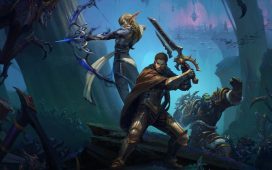Private investigator Howard Lotor isn’t welcome in many joints in his home city of Vancouver. And it isn’t even because of the trenchcoat or leading questions. It’s because he’s a raccoon – and raccoons are one rung up from dirt, if you ask the dogs, bears, foxes and other bourgeois fauna who live in the upmarket areas.
Like any decent private dick from old Hollywood, then, he’s downtrodden and cynical even before the noir hits the fan. The story begins with a worried wife clutching a photograph of her missing husband, and from there Backbone freewheels through genres and themes, working off an old-school adventure game framework. There’s an exclusive bar, and the experimental drug rumoured to be dealt in its velvet booths; missing girls; conspiracy; cannibalism; and a city whose population has never seen beyond its surrounding walls – enough to tide over a Netflix original, let alone an indie adventure game. It’s true that you’re only ever walking from side to side and hitting a prompt to interact with things, but it doesn’t feel too limited – not even when the puzzles dry up after the first act in the name of pacier storytelling.
The hierarchy and bigotry of this dystopian Vancouver’s animal citizens are exactly the barely veiled commentary they appear to be. Storytellers of interactive works have long leaned on allegory when they talk about racism and we’ve all heard enough snide remarks from Skyrim’s nords and Deus Ex’s anti-augment humans by now to get the idea. But still, the idea’s worth repeating. In game worlds, if you happen to be walking past as some everyday prejudice unfolds, you can confront it or you can keep on walking. In Backbone’s case, you’re made to feel the sharp end of it and watch as others keep on walking. They really don’t like raccoons around here.
The developer is committed to putting Lotor – and by extension the player – through the wringer in a way that’s rather bewildering. And the final act, which dramatically shifts in tone and genre, left me even more bewildered. What begins as Raymond Chandler with whiskers morphs through sci-fi and kitchen sink melodrama before the end credits appear.
Anyone seduced by the gorgeous sprites and moody rainfall over pixel-perfect cityscapes of the first few hours would be completely thrown by the ending, and not in a good way. Classic noir, an intriguing setting and interesting (if obvious) puzzles are what this game does best. The decision to veer away from all of that in the conclusion undermines what went before, and leaves you wondering what on earth just happened.













